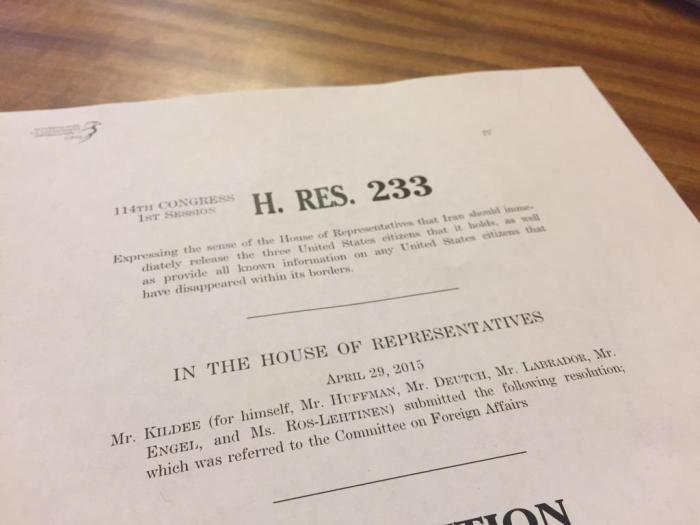by Rick Gladstone, NY Times, May 1, 2015
Congressional lawmakers, already conflicted about an impending nuclear deal with Iran, are increasingly angry over the incarceration of American citizens in that country, where at least three are imprisoned, including one held for more than three and a half years.
Whether that anger could grow and have a bearing on the outcome of the nuclear talks is unclear.
WATCH: Congressman Dan Kildee of Michigan goes on CNN to explain the need for Iran to free Amir Hekmati and 3 other Americans. Amir, a constituent from Flint and former U.S. Marine, is an innocent man who has been held captive in an Iranian prison for three 1/2 years. https://www.youtube.com/watch?feature=player_embedded&v=9AyWVYAlsNI
The latest evidence of indignation was seen on Thursday when Representative Dan Kildee, Democrat of Michigan, announced at a news conference in Washington that he had introduced a bipartisan congressional resolution that says in part, “Iran should release all detained Americans immediately and provide any information it possesses regarding any Americans that have disappeared within its borders.”
In a telephone interview, Mr. Kildee said that he hoped the resolution would pass unanimously and that he anticipated it would be set for a vote well before the conclusion of the nuclear talks, which face a June 30 deadline.
“This is a very high priority,” he said. “Iran should understand that the American people and American Congress are watching.”
There is no provision in a framework nuclear agreement reached four weeks ago between Iran and the group of six world powers, including the United States, for the release of the Americans.
While the Obama administration has kept the nuclear and prisoner issues distinct, it has repeatedly pressed Iran to free the prisoners in discussions held on the sidelines of the negotiations, which are aimed at guaranteeing Iran’s nuclear activities remain peaceful in exchange for a termination of economic sanctions on the country.
Mr. Kildee’s constituents include the family of Amir Hekmati, 31, of Flint, a Marine veteran whose parents emigrated from Iran. He was seized while visiting relatives in August 2011, convicted of spying and sentenced to death, a verdict later reduced to helping a hostile country, with a 10-year sentence.
The other Americans known to be incarcerated are Saeed Abedini, 34, of Boise, Idaho, a Christian pastor imprisoned since 2013 on charges of disturbing national security, and Jason Rezaian, 39, of Marin, Calif., The Washington Post’s Tehran correspondent, who was arrested last July and is facing espionage charges.
All of them have declared they are innocent of any wrongdoing. A fourth American, Robert A. Levinson, disappeared in Iran in March 2007. The Iranian authorities have said they do not know what happened to Mr. Levinson.
Iran’s government considers Mr. Hekmati, Mr. Abedini and Mr. Rezaian Iranian citizens because all are of Iranian descent, and it has refused to acknowledge their American nationality. Yet people connected to the families of all three say they believe that the Iranians are essentially using them to gain concessions from the United States.
The Washington Post, which has called the treatment of Mr. Rezaian an absurdity that violates Iran’s own laws, said in an editorial published Thursday that Iran should “pay a price” for its behavior, which called into question its credibility on international commitments, “including the prospective nuclear accord.”
In what could become another problem for Iran’s credibility on the nuclear issue, Reuters reported Wednesday that a United Nations Security Council committee that supervises the Council’s sanctions on Iran had been informed of an Iranian nuclear procurement network linked to two blacklisted firms. While Iran has never regarded the Security Council sanctions as valid, the report suggested to Iran’s critics that it would not honor provisions of a final nuclear agreement.
Spain leads the sanctions committee. Fernando Fernández-Arias, a spokesman for Spain’s United Nations mission, declined to comment on the Reuters report.



